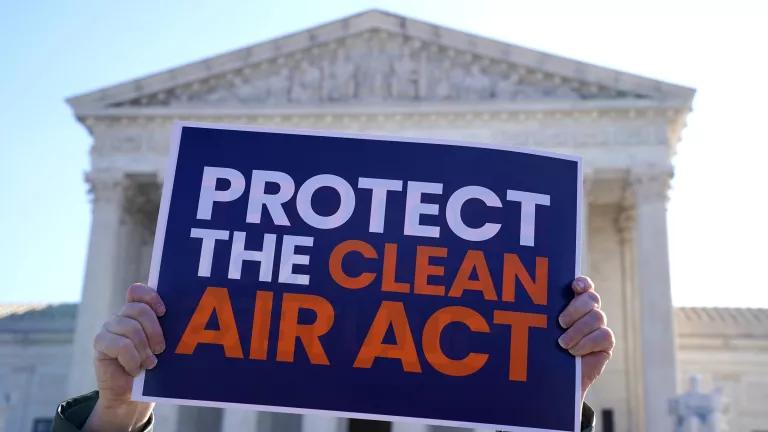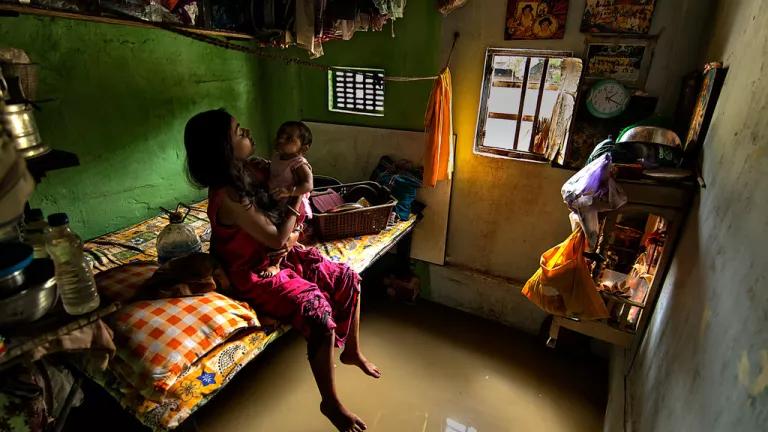Will the Supreme Court Protect the Clean Air Act?
The court’s decision in West Virginia v. EPA could roll back decades of progress at a time when we can least afford it.

Yesterday was a pivotal day for the climate in the arenas of both science and law.
The Intergovernmental Panel on Climate Change released its latest report detailing the already extensive and destructive impacts of climate change on people and ecosystems worldwide—as well as the need for both accelerated actions to adapt to a warming world and rapid and deep cuts in greenhouse gas emissions to limit the damage.
On the same morning, the Supreme Court heard oral arguments in West Virginia v. EPA, in which coal industry interests and red state attorneys general seek to have the court severely curtail, or altogether eliminate, the U.S. Environmental Protection Agency’s (EPA) authority to limit carbon pollution from power plants—the nation’s largest industrial source of such pollution.
This litigation has taken a long and winding road, and NRDC has been a party to all of it. Along with our other public health, environmental, and clean energy allies, we filed briefs in this Supreme Court case—an appeal of our D.C. Circuit challenge to the Trump EPA’s repeal of the Clean Power Plan and that court’s decision in our favor. And years before that, we intervened to defend the Clean Power Plan against legal challenges.
It’s never a good idea to speculate on the outcome of a case based on oral argument, but here are a few observations:
- Most of the Justices’ questions related to the “major questions” doctrine, a relatively recent and somewhat vague legal doctrine that administrative agencies cannot issue regulations of great economic or political significance without explicit congressional instruction. But this case is not an easy fit for this doctrine, since there is no rule currently in effect.
- Given the lack of any final rule before the court, the justices asked a number of questions about whether the case is justiciable—that is, whether there is a live “case or controversy” for the court to review—but gave few hints about where the court will land on the issue.
- In a bit of good news, there was almost no discussion of altogether eliminating EPA’s authority to regulate power plants’ CO2 emissions by overturning the Supreme Court precedents of Massachusetts v. EPA and American Electric Power v. Connecticut.
While the justices heard oral argument inside, NRDC was also among the advocates, parents, scientists, lawyers, and concerned citizens who rallied outside the Supreme Court on Monday morning to demonstrate our commitment to protecting the Clean Air Act and EPA’s ability to act on climate.
We heard remarks from experts and activists alike—a climate scientist, a pediatrician, moms concerned for their children, and youth activists worried about their future.
As West Virginia activist Maura Ross summed up the stakes: “The court can either choose to protect the Clean Air Act and our future or to protect the profits of the coal industry and the ambitions of far-right politicians.”

Maura Ross, chair of West Virginians for Sustainable Development and a member of the Eastern Panhandle Green Coalition
Leigh Vogel/Getty Images for NRDC
It was heartening to see so many friends, colleagues, and allies gathered on the Supreme Court steps in solidarity. We need the whole community in this fight, more than ever—as yesterday’s IPCC report summary concluded: “Any further delay in concerted anticipatory global action on adaptation and mitigation will miss a brief and rapidly closing window of opportunity to secure a liveable and sustainable future for all.”
The Supreme Court’s decision in West Virginia v. EPA could roll back decades of progress at a time when we can least afford it. But no matter what the outcome of this case, we need all hands on deck to keep fighting for climate action at the federal, state, and local levels.

The author, Lissa Lynch, listens in as the Supreme Court hears arguments from the coal companies and their allies who are trying to gut the Clean Air Act and block climate action.
Leigh Vogel/Getty Images for NRDC



